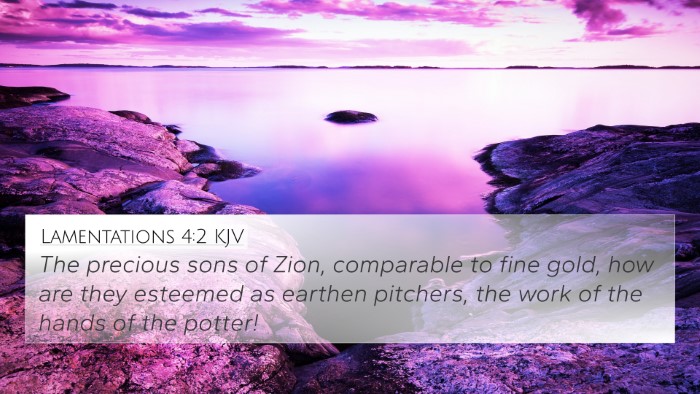Ezra 8:27 - Understanding the Scripture
In Ezra 8:27, we encounter a significant moment in the narrative of Israel's return from exile. This verse specifically details the offering of valuable items, including 20 gold bowls, which emphasizes the importance of dedicating resources to God. The backdrop of this passage emphasizes the spiritual and communal responsibilities of the Israelites as they seek to restore their identity and worship after captivity.
Verse Context and Summary
Ezra, a scribe and leader, is tasked with leading a group of exiles back to Jerusalem. The chapter outlines the preparations for the journey, the assembling of the people, the proclamation of a fast for divine protection, and the gathering of valuable items for the temple.
Commentary Insights
-
Matthew Henry:
Henry notes the significance of the gold bowls, which symbolize purity and the value of true worship. He emphasizes that the offerings made were in accordance with God's Law, indicating a restoration of covenant fidelity among the people of Israel.
-
Albert Barnes:
Barnes elaborates on the specific numbers and types of offerings made in this context. These offerings are seen as an act of devotion and commitment as the people return to their homeland to rebuild the temple and re-establish worship.
-
Adam Clarke:
Clarke discusses the historical context, reminding readers that these items were to be used in the temple, illustrating the people's desire to honor God in their new beginning. He also highlights the communal effort involved in this act of dedication.
Connections to Other Bible Verses
Ezra 8:27 can be connected to several other scriptures, highlighting broader biblical themes:
- Exodus 25:3-7: This passage details the offerings required for the tabernacle, including gold and other precious materials.
- 1 Chronicles 29:6-9: Here, we see the leaders giving generously to the temple of God, echoing the themes of community and sacrificial giving.
- 2 Chronicles 24:10-14: This verse discusses contributions for the repairs of the temple, showcasing God's people's commitment to worship.
- Nehemiah 10:32-33: The Israelites make commitments to bring their offerings to the house of God, paralleling the dedication seen in Ezra's journey.
- Malachi 3:10: God's challenge to bring the full tithe into the storehouse enhances the idea of putting God first through material offerings.
- Philippians 4:18: Paul speaks of gifts sent to him, linking the idea of giving to support ministry, reminiscent of the temple offerings.
- Hebrews 13:16: The author encourages believers to do good and share, reinforcing the heart of giving as an act of worship.
Thematic Connections
This verse stands as a testimony to themes such as:
- Restoration: The act of offering highlights Israel's restoration and return to their covenant relationship with God.
- Community Responsibility: Each individual contributes, showing a collective effort in re-establishing their home and worship practices.
- Worship through Giving: The emphasis on valuable items signifies that true worship often manifests in our resources and how we dedicate them to God.
Conclusion
Ezra 8:27 is not just a historical reference but a rich source for understanding God's call to His people to participate in His work through dedicated offerings. Through connections with other Scriptures, we see how this theme is woven throughout the Bible, inviting believers to examine their own hearts regarding their contributions to worship and community.
How to Use Cross-References in Bible Study
Engaging in cross-referencing can deepen understanding and reveal the interconnectivity of Bible verses. Here are some tools and methods:
- Bible Concordance: Utilize a concordance to find related verses by topic or keyword.
- Bible Cross-Reference Guide: This tool can help locate verses that discuss similar themes or narratives.
- Comparative Bible Verse Analysis: Analyze how different scriptures address a common theme or event.
- Cross-Referencing Bible Study Methods: Group Bible verses by topics and study them together to uncover deeper meanings.
Final Thoughts
Understanding Ezra 8:27 requires looking at it through the lens of broader Biblical teachings and themes. Through careful study and cross-referencing, one can appreciate the rich, interconnected nature of Scripture, inviting deeper faith and commitment in worship.



